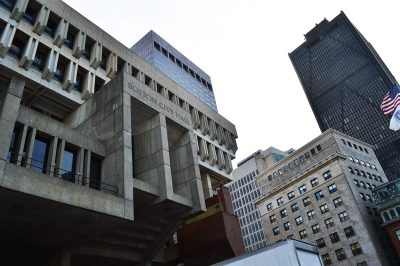Mayor Marty Walsh’s nomination as Secretary of Labor for the Biden administration marks a new mayoral race for Boston — one that could quickly become historic.

City Councilors Michelle Wu and Andrea Campbell have already announced their races and are the current frontrunners.
Though the pool of candidates will likely grow, this initial start gives the city a chance to change its long history of electing white, male mayors, and potentially choose the first woman of color to lead the majority non-white city.
Even before the election, if Walsh is confirmed by the Senate, City Council President Kim Janey will be appointed as acting mayor, making history as the city’s first Black woman to serve as mayor.
The dawn of a new era in Boston government marks an opportunity to reflect on the city’s largely white history.
Graham Wilson, a Boston University professor of political science, is the director of the Initiative on Cities — BU’s “hub” for research and teaching relating to urban areas. Wilson said the mayor of Boston is particularly important because of their influence over departments like education, which he said is in “extreme contrast” to places such as Cambridge, where the mayor is more symbolic.
“The Boston mayorship is unusual because it’s unusually powerful,” Wilson said. “This is a city where the mayor is … more powerful than is the case with mayors in other cities.”
Katharine Lusk, executive director of the Initiative on Cities, said this unique power is also due to Boston’s lack of a city planner. The mayor is the political leader and head of the city, so they have a lot of authority, she said.
Wilson said once a Boston mayor is elected, “they usually stay in office,” but pointed to the ’40s for a notable exception in the case of James Curely.
While finishing a five-month sentence in prison for mail fraud, Curely was re-elected mayor for a fourth term, but he lost to John Hynes, then acting mayor, once he was released in 1949.
Wilson said a recent, notable force of change in the city’s mayoral history was the late Thomas Menino — the city’s longest-serving mayor — who began his term in 1993 and served for two decades. Wilson said Menino was known as a “mayor of neighborhoods” — Menino personally met over half of the city’s residents.
“He was very conscious of the fact that Boston is a city composed of different neighborhoods,” Wilson said, “and he related to each one of those neighborhoods very closely.”
Wilson said Menino was very innovative, and he worked with Wilson to create the Initiative on Cities. Menino told The New York Times in 2012 he was most proud of making Boston a more accepting place for immigrants and marginalized communities.
Walsh, who succeeded Menino in 2014, instead strove to view the city as a whole, Wilson said, rather than as a collection of neighborhoods. He started projects such as the visionary “Imagine Boston 2030” — the first citywide plan in 50 years.
Since Boston mayors have been white men since John Phillips in 1822 — the city’s first mayor — Wilson said the potential to change this trend is important.
“If we were to have a non-white man, that would be a big symbolic change, and that sort of symbolism is important,” Wilson said. “It would give additional push to the question of … assuming that the city bounces back, how do we share that prosperity more equally?”
Lusk, who said she worked for Menino, said one of a mayor’s essential roles is creating a “healthy fiscal situation,” which Menino and Walsh, as well as the preceding mayors, have executed well, she said.
Another major responsibility of the next mayor will be education, specifically reopening schools and economic development, Lusk said. Additionally, the new mayor will have to address the post-pandemic world.
“There still will be a lot of lingering health crises that the mayor will have to tackle,” she said. “That’s mental health crises, that’s addiction … that’s food insecurity, a whole range of health issues that have been largely invisible to people because everyone has been home.
Throughout the years, the mayors of Boston have shaped the city into a place where “many different kinds of people want to be,” Lusk wrote in a follow-up email. The new mayor will be essential in maintaining that progress.
“None of these things happen without good government,” Lusk wrote. “Our recent mayors have been clear that everyone is welcome, and worked hard to make space and provide a good quality of life to everyone who calls Boston home.”



















































































































